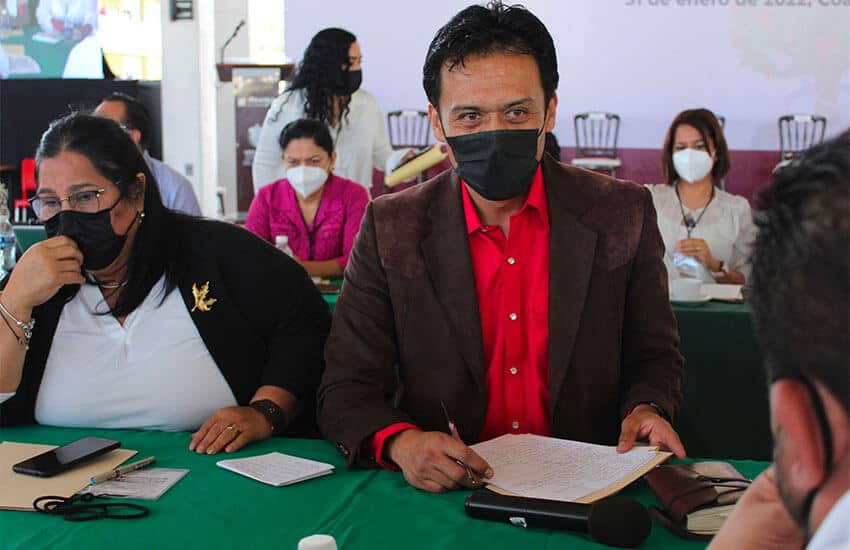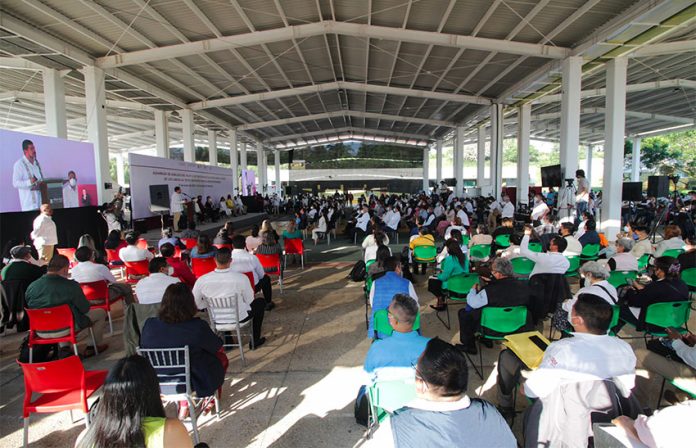Words and concepts considered “neoliberal” by the federal government look set to be scrapped from new textbooks for primary and middle school students.
In a document distributed to attendees of a series of meetings on the design of free textbooks for basic education students, the Ministry of Public Education (SEP) advises against the use of words and concepts such as “educational quality,” “competition,” “knowledge society,” “efficiency” and “productivity.”
The SEP asserts that the Organization for Economic Co-operation and Development (OECD), non-governmental organizations and “groups close to the business sector” intervened in educational reforms carried out over the past 30 years and succeeded in introducing “the concept of quality to measure the performance of the education system.”
In a 157-page document, downloadable via the scanning of a QR code, the ministry also insinuates contempt for seemingly innocuous words such as “equity,” “coverage” and “graduation.”
President López Obrador frequently rails against what he describes as Mexico’s “neoliberal period” – the 36 years before he took office in late 2018.
Speaking at the first textbook design assembly, held on Tuesday, the SEP’s director of educational materials said that education needs to be conceived in an alternative way in order to put an end to “the neoliberal dream.”
Marx Arriaga Navarro, who has previously told textbook authors to “eliminate authoritarian discourse” from existing texts, asserted that the OECD sought to have educators removed from the process of designing education policy and content in Mexico.
Its board, Arriaga claimed, said: “’The education reform is too important for the future of Mexico … to leave it to educators …’”
“But, what do you know? We’re not infants. … We will not accept education policy being imposed on us. … These assemblies are the first step toward completing the guiding documents that the country needs,” he said.
Arriaga said that a “different way” of educating must be developed and claimed that previous governments misled the nation.
“They promised us that if the companies did well the workers would do well and today we see that’s not the case. Not even money brings happiness and this excessive industrial development and this free market [model] they proposed is destroying the environment, morals and security,” he said.

Arriaga also criticized the system of educational evaluation and diagnostic testing designed by previous governments.
Education experts who spoke with the newspaper El Universal predicted that nothing good will come out of the SEP textbook design assemblies.
“… Those who are going to attend are supporters of [the ruling party] Morena, of [Education Minister] Delfina Gómez. … [They’ll be] factious, partisan meetings. The only thing we can expect from these assemblies is that trash, monstrosities that could … cause tremendous damage in the education of children and adolescents will come out,” said Gilberto Guevara Niebla, director of the Institute of Educational Research at the Autonomous University of Guadalajara.
The former deputy education minister, a leader of the student movement that was violently repressed by the government at the 1968 Tlatelolco massacre, charged that assemblies such as those organized by the SEP are not the correct forums for the development of new textbooks.
The content of textbooks is “not resolved in assemblies,” Guevara said. “That’s the problem. … Scientists don’t meet in assemblies to create new knowledge, it’s absurd.”
The staging of the assemblies is nothing more than “a vulgar maneuver to create the appearance that the SEP is doing something when in reality it has done very little,” he added.
Guevara also said it’s absurd that the SEP considers words such as “quality, competition, performance and evaluation” to be neoliberal terms.
Similarly, the former chief of the now-defunct National Education Evaluation Institute said that “competition” and “quality” are not “concepts invented by any neoliberal current.”
“They’re concepts that have been used for years to refer to fundamental education processes,” Eduardo Backhoff Escudero said.
“All this is part of … a narrative … that they’re making a real change in education, when what they’re [actually] doing is just changing words,” he said.
Carlos Ornelas, an academic at Mexico City’s Metropolitan Autonomous University who has a doctorate in education from Stanford University, claimed that the SEP has already decided on the content for new textbooks and curriculums and is only using the assemblies to “legitimize” it.
“There is already a direction [for education in Mexico] but there is no clear strategy,” he said.
With reports from El Universal
